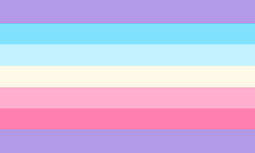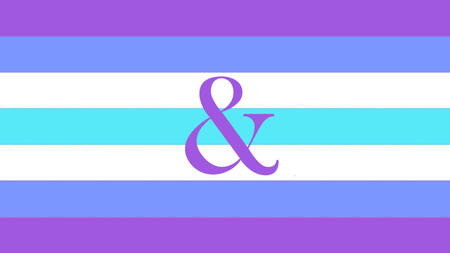ㅤㅤ
What is Transplurality?
The definition given in the term's coining is: those who believe they were/are supposed to be plural!Transplural is a large umbrella term describing anyone with the experience of feeling like they should be plural, as well as desiring to be plural. It falls under the transid umbrella and can refer to any form of plurality, including traumagenic, endogenic, disordered, and non-disordered pluralsNo form of neurological or plurality-based dysphoria is required to be transplural, and no transplural person is required to transition! It's also possible to be both transplural and cisplural, or already plural, or fall outside of or between those labelsSome transplurals may create their own headmates as a part of becoming plural too! This can be an important part of transitioning for them, and it's good to remember that if a transitioned transplural system doesn't want to disclose if or how they created their own headmates, or they prefer considering themselves an origin they technically aren't, respect that! It may make them uncomfortable or dysphoric otherwiseIt's also important to note that not every plural will consider themselves transplural, even if they're a created plural or desire to be plural - labels are a personal choice!
Transplural Terms
Basic Glossary:
Transitioning: in this context, transitioning can include forming or integrating headmates, developing a certain plural origin, and/or presenting as plural online or in the real worldCisnonplural/Cissinglet: those who are not plural/a singlet and aren't transplural (though they could identify as transplural as well)
Cisplural: those who are plural and aren't transplural (though they could identify as transplural as well)Endogenic: a system+, or part of one, that was not formed due to trauma
Traumagenic: a system+, or part of one, that was formed due to trauma
Disordered: a system+ that has a disorder that could cause plurality (eg. DID/OSDD/UDD, some include BPD or other disorders)
Non-Plural/Singlet: someone who isn't pluralSystem: a singular body with multiple states of identity, or headmates, within it - this definition is broad and varies
Plural: a broader term that includes any form of being 'more than one', some people are plural non-systems, meaning they're plural but not a system or don't identify as one(system+: systems, plural non-systems, and any form of plurality)
ㅤ

Transendo

Transdisoplural

TransDID

TransOSDD-1a

TransOSDD-1b

TransUDD

Transsinglet

Transsingletflux

Metaplural

Monoisaplural

Fyloplural

Mutaplural
Forms of Plurality and NonpluralityTransendo(genic): transplurals who believe they were/are supposed to be an endogenic pluralTransdisoplural: transplurals who want to or have transitioned to be a disordered plural, want their disordered plurality to be more/less impairing, etcTransDID: those who want to transition to acquire DID or transition to having DID, want their DID to be more/less impairing, etcTransOSDD-1a: those who want to transition to acquire OSDD-1a or transition to having OSDD-1a, want their OSDD-1a to be more/less impairing, etcTransOSDD1-b: those who want to transition to acquire OSDD-1b or transition to having OSDD-1b, want their OSDD-1b to be more/less impairing, etcTransUDD: those who want to transition to acquire UDD or transition to having UDD, want their UDD to be more/less impairing, etcTranssinglet:: someone who is plural and wants to transition to being, or believe they were supposed to be a singletTranssingletflux: fluctuating between wanting be a singlet, and remaining pluralTransitioningMetaplural: transplurals who are transitioning and or starting to transition to being pluralMonoisaplural: transplurals who have not transitioned to being pluralFyloplural: transplurals who have fully transitioned to being pluralOtherMutaplural: being cisplural but feeling as if you should have been transplural or identifying as transplural while being cisplural
Flagless TerminologyTranstraumagenic: transplurals who want to be, or believe they were supposed to be a traumagenic pluralTransneurogenic: transplurals who want to be, or believe they were/are supposed to be a neurogenic pluralTransnondisoplural: transplurals who want to be, or believe they were/are supposed to be an non-disordered pluralP-Transplural ( Partial Transplural): those who are partially transplural but not fullySpiteplural: those who identify as plural or transplural out of spite
Questions and Answers
Does this appropriate the trans- prefix / the concept of dysphoria?The answer is no, you can't appropriate a widely used suffix! Not all transgender people transition, not all transplurals transition, some do! Trans as a prefix isn't forever attached to transgender. Gender dysphoria is a subset of dysphoria, meaning there are other types of dysphoria or other situations dysphoria can be applied to, including neurodivergence and pluralityHow would a transplural person help their dysphoria?This doc and this doc have some ideas! But it's really any way that works for them - some may also use thoughtform guidesIsn't tulpamancy cultural appropriation?Multiple resources discuss this topic and it's still thoroughly debated, and whilst not all transplurals perform tulpamancy, some may as it helps them feel a lot better and it isn't appropriate to judge people for making that decision. Other terms like thoughtforms can also be used in place of tulpas to avoid this controversy. This carrd and this post go pretty in-depthWhy would someone want to have DID/OSDD/UDD? Isn't that romanticizing the concept?It differs for everybody. A lot of that time it can be connected to an experience that makes the person feel like they should have developed these disorders, a form of dysphoria or mental disorder that causes them to feel as if they should have these disorders, and similar ideasRomanticising dissociative disorders like these would mean 'to describe them in an idealized or unrealistic fashion', whereas here people are genuinely attached to the concept of having them, not just because they see them as overly 'good' or 'positive' disorders to have
